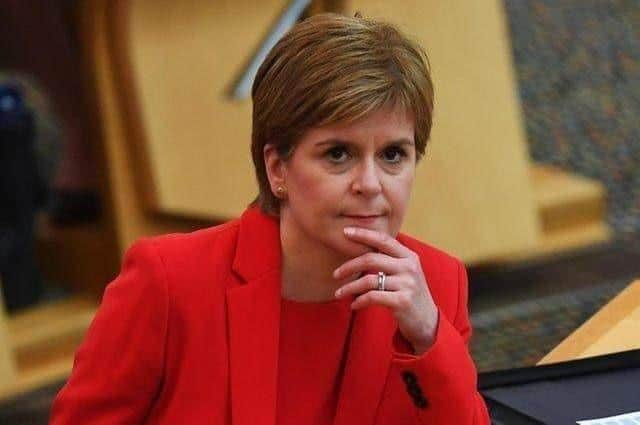Nicola Sturgeon told to reallocate £20m independence referendum fund to frontline services
The First Minister faced a chorus of calls to divert the money following the Supreme Court’s ruling that the Scottish Parliament does not have the power to legislate for another vote without the UK Government’s agreement.
The decision came as a blow to Ms Sturgeon, who wanted to hold a second referendum in October next year. She says the SNP will now treat the next general election as a “de facto” referendum, although it is not clear how this would work in practice.
Advertisement
Hide AdAdvertisement
Hide AdScotland’s pro-Union parties have already ruled out treating the election as a single-issue vote. Labour, the Conservatives and the Liberal Democrats all criticised Ms Sturgeon’s plan.


Labour’s Ian Murray, the shadow Scottish Secretary, said: “It will be an election focused on booting the Tories out of Downing Street – not Nicola Sturgeon’s obsession with division.”
Scottish Tory leader Douglas Ross added: “It’s not up to politicians to dictate what the public should be interested in at a general election – it’s up to every party to come up with a range of policies on local and national issues.”
The Scottish Government’s resource spending review, published in May, included £20m for a referendum. A briefing note sent to SNP politicians reportedly suggests taxpayers’ money will continue to be used to make the case for independence.
Mr Ross insisted there is “absolutely no justification” not to use this money to support public services or tackle the cost-of-living crisis. His party said it could fund more than 1,000 new nurses, more than 650 police constables or around 600 teachers for a year.
He said: “It was utterly shameful that Nicola Sturgeon and her Government ever set aside this amount of money to pursue their number one obsession of breaking up the United Kingdom.
“Nicola Sturgeon responded to the Supreme Court verdict as SNP leader rather than as First Minister. Why should taxpayers be footing the bill for her party-political campaigning when she could not be bothered to answer questions in Parliament?
“With the unequivocal ruling, there will be no referendum next year. So there is absolutely no justification for them failing to reallocate every penny of their referendum fund. This is millions of pounds’ worth of funding that could support families and businesses through the global cost-of-living crisis or help our NHS through a winter storm.
Advertisement
Hide AdAdvertisement
Hide Ad“It would be inexcusable if nationalist ministers refused to divert money towards frontline services or those who need it most. We constantly hear ministers moaning about a lack of funds for Scotland’s public services, but they have always protected their referendum slush fund.
“Ministers could also avoid crippling strike action, which will cause disruption for millions and be deeply damaging for the economy, if they put this sum towards pay deals. These are the issues Scots want the SNP-Green government to be focused on tackling.
“Enough is enough. A majority of Scots do not want this referendum and there is no legal basis for it. The SNP-Green government can either continue to take their eye off the ball and divide our country all over again or they can deal with the real priorities facing Scotland – and that starts by switching this £20m to other cash-strapped budgets.”
Scottish Liberal Democrat leader Alex Cole-Hamilton said the £20m should be spent on supporting those with long Covid. Analysis by his party shows Scotland has committed just £3m to tackling long Covid this financial year, compared to £90m in England and £5m in Wales. This means England is currently spending £107 per head and Wales is spending £90 per head, compared to just £16 per head in Scotland.
Mr Cole-Hamilton said: “Across the UK, the ONS [Office for National Statistics] believes that half a million more working-age people are economically inactive due to ill health. That is the price of both long waiting lists for treatment and long Covid.
“This SNP/Green government are spending just £16 a head to help people who may find themselves out of work, utterly immobilised and gasping for air. That’s the price of a takeaway. No wonder people with long Covid feel abandoned.
"The Scottish Government have suddenly found themselves with £20m spare after their embarrassing Supreme Court defeat. That money should be used to deliver the comprehensive treatment and support that people with long Covid so desperately need.
“The Scottish Government must deliver a firm commitment to country-wide access to long Covid clinics, in-home support for those that need it, and physio and rehab. At the moment Scots who are struggling with this condition would be better off moving to England."
Advertisement
Hide AdAdvertisement
Hide AdPamela Nash, chief executive of pro-UK campaign group Scotland in Union, said: “There is no shortage of vitally important matters the SNP-Green Government could be spending this public money on. That includes support for energy bills, addressing the cost-of-living crisis or helping the poorest people feed their families.
“It would be inexcusable in this environment, especially after the Supreme Court judgement, for the nationalists to hoard millions of taxpayers’ pounds for a nationalist propaganda campaign.”
Asked about the money earmarked for a referendum at a press conference on Wednesday, Ms Sturgeon said the Scottish Government will shortly set out its Budget for the next financial year. She said: “While I’m being realistic about the short-term, I still hope that we will have a UK Government that accepts democracy and we will have an agreed referendum, but we will take decisions around our budget in the normal way.”
A spokesman for the First Minister said: “Obviously [the £20m] was in the Budget not for this financial year, but for next financial year. [Deputy First Minister] John Swinney will take forward the Budget process for next year across all portfolios and update Parliament in the middle of next month.”
Comments
Want to join the conversation? Please or to comment on this article.
